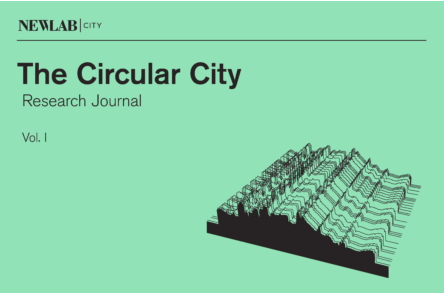
First Volume of Circular City, A Research Journal by New Lab edited by André Corrêa d’Almeida: “…Circular City Data is the topic being explored in the first iteration of New Lab’s The Circular City program, which looks at data and knowledge as the energy, flow, and medium of collaboration. Circular data refers to the collection, production, and exchange of data, and business insights, between a series of collaborators around a shared set of inquiries. In some scenarios, data may be produced by start-ups and of high value to the city; in other cases, data may be produced by the city and of potential value to the public, start-ups, or enterprise companies. The conditions that need to be in place to safely, ethically, and efficiently extrapolate the highest potential value from data are what this program aims to uncover.
Similar to living systems, urban systems can be enhanced if the total pool of data available, i.e., energy, can be democratized and decentralized and data analytics used widely to positively impact quality of life. The abundance of data available, the vast differences in capacity across organizations to handle it, and the growing complexity of urban challenges provides an opportunity to test how principles of circular city data can help establish new forms of public and private partnerships that make cities more economically prosperous, livable, and resilient. Though we talk of an overabundance of data, it is often still not visible or tactically wielded at the local level in a way that benefits people.
Circular City Data is an effort to build a safe environment whereby start-ups, city agencies, and larger firms can collect, produce, access and exchange data, as well as business insights, through transaction mechanisms that do not necessarily require currency, i.e., through reciprocity. Circular data is data that travels across a number of stakeholders, helping to deliver insights and make clearer the opportunities where such stakeholders can work together to improve outcomes. It includes cases where a set of “circular” relationships need to be in place in order to produce such data and business insights. For example, if an AI company lacks access to raw data from the city, they won’t be able to provide valuable insights to the city. Or, Numina required an established relationship with the DBP in order to access infrastructure necessary for them to install their product and begin generating data that could be shared back with them. ***
Next, the case study documents and explains how The Circular City program was conceived, designed, and implemented, with the goal of offering lessons for scalability at New Lab and replicability in other cities around the world. The three papers that follow investigate and methodologically test the value of circular data applied to three different, but related, urban challenges: economic growth, mobility, and resilience.
Contents
- Introduction to The Circular City Research Program (André Corrêa d’Almeida)
- The Circular City Program: The Case Study (André Corrêa d’Almeida and Caroline McHeffey)
- Circular Data for a Circular City: Value Propositions for Economic Development (Stefaan G. Verhulst, Andrew Young, and Andrew J. Zahuranec)
- Circular Data for a Circular City: Value Propositions for Mobility (Arnaud Sahuguet)
- Circular Data for a Circular City: Value Propositions for Resilience and Sustainability (Nilda Mesa)
Conclusio (André Corrêa d’Almeida)